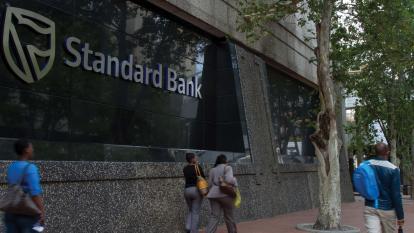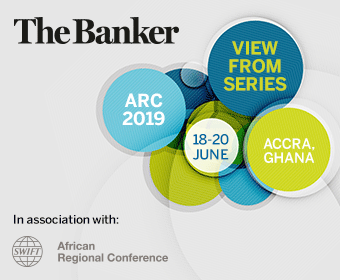A quintet of big banks dominate South Africa's banking scene, but this could change as the arrival of several low-cost digital banks triggers competition.
View from Swift African Regional Conference 2019
In light of the ongoing outbreak and global escalation of the coronavirus, SWIFT is taking precautionary measures to limit larger community events during this period. Accordingly, SWIFT have decided to cancel the African Regional Conference (ARC), scheduled to take place in Cape Town on 21-23 April 2020.
For more information see www.swift.com/ARC2020
Day 3
- Ade Ayeyemi, CEO, Ecobank - View from ARC 2019
- Aly Abdel Raouf, head of operations, QNB Alahli Egypt - View from ARC 2019
- Jan Pilbauer, chief payments and innovation officer, BankservAfrica - View from ARC 2019
Day 2
- Kevin Rudahinduka, transformation program director, Bank of Kigali - View from ARC 2019
- Moono Mupotola, director of regional integration, African Development Bank - View from ARC 2019
- Dr. Kasirim Nwuke, chief of new technologies and innovation section, United Nations Economic Commission for Africa - View from ARC 2019
Day 1
- Christabel Onyejekwe , executive director, business development, Nigeria Interbank Settlement System - View from ARC 2019
- Julian Opuni, CEO, Fidelity Bank Ghana - View from ARC 2019
Previews
African Regional Conference 2019
Date: 18-20 June
Location: Accra, Ghana
The SWIFT African Regional Conference will look at how Africa's financial industry is evolving. The international payments landscape is undergoing significant change as disruptive technologies enter the payments market and put pressure on traditional banking practices. Regulatory scrutiny around KYC and AML and changes in consumer and client behaviour are also forcing the industry to review traditional banking models.
The Banker’s View from ARC 2019 provides regular multimedia coverage and summarises the key themes from the SWIFT African Regional Conference 2019.
In discussion:
- Drivers of change in Africa’s financial industry
- Delivering change – equipping the financial industry with tools for the future
- Mitigating risk in the digital world
- Boosting intra-African trade
- Re-engineering international payments for a fast, digital age
- How banks are embracing technology to optimise compliance
Register to receive The Banker weekly e-newsletter and 3 free monthly views
The Banker provides economic and financial intelligence for the world's financial sector and has built a reputation for objective and incisive reporting. The Banker strives to stimulate and inform, offering an unparalleled outlook with a wide range of news, features, analysis and interviews, and in-depth coverage of all the key issues facing the financial sector.
Register today to receive The Banker weekly e-newsletter and 3 free monthly views
Free to read

Tanzania's banking sector returns to stability
May 1, 2019Poor lending policies and over-exposure to a faltering real estate sector have seen Tanzania's banks experience an uncomfortable past few years. However, they have since managed to correct this situation.

Sub-Saharan African markets eye the benefits of consolidation
March 1, 2019The heightened M&A activity in sub-Saharan Africa is garnering enthusiasm over the potential creation of a leaner, fitter and more adaptable banking sector across the region.

AI in Africa: a different kind of intelligence
February 1, 2019AI has still to make its presence felt in Africa's banking sector, but brings with it opportunities to bank the unbanked and engage with the continent's youthful population. However, as Kit Gillet reports, Africa's unique needs mean achieving these goals is not straightforward.
Related articles by SWIFT
A new white paper from SWIFT, mapping commercial payment flows against financial flows in Africa, reveals that that intra-Africa payments and clearing is increasing in importance. It also points to an increase in the use of African currencies for cross-border payments.
Corruption, cybercrime and compliance – managing the risks
Managing risk in financial institutions has never been more complex. As cyber-attacks continue to evolve and increase in frequency and sophistication, cyber security has become a major area of attention and investment. Complying with the large number of global regulations that aim to combat money laundering and terrorist financing is also a challenge for the industry, both in terms of costs and resources.




